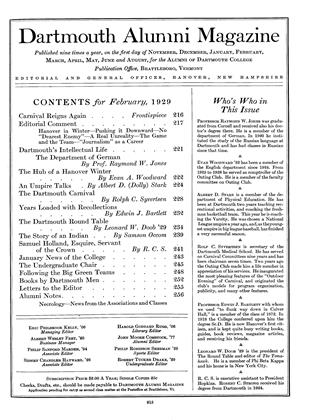By Professor Malcolm Keir, editor of the series Industries ofAmerica, of which this is the first volume. New York: The Ronald Press, 1928. (610
pages.) In this large and well printed volume we have the fascinating story of the erection of an economic empire without a parallel in history. Had Homer been given this task he would doubtless have begun something after this wise, "I sing the rise of the machine and the wonders it has wrought." For the book is really a prose epic of the triumphs of the machine process in American culture. Professor Keir, to be sure, is not free to indulge in any poetic license for that would be "unscientific" and to be "unscientific" is the academic mortal sin. He is ever loyal to facts. But in every chapter he lets us feel that the dramatic elements in his story fire his imagination. I am inclined right at the start to pick a quarrel on the ground that the machine does not get its deserts. A short introductory chapter differentiating the machine from the tool, defining its relation to the machine process and stating its fundamental place in the structure of our American culture would have been a fitting prolog to this prose epic. However I remind myself that I am neither a poet nor an economist but merely a sociologist and hold my peace.
Were all books on economics as interesting as this Carlyle would hardly have uttered his famous dictum about the "respectable professors of the dismal science." There is not a dull page, hardly a dull paragraph, in the book. This is due primarily to a style that has genuine literary distinction. The writer's words fit his ideas as a glove fits the hand. His sentences are models of perspicacity. He is evidently fond of the picturesque, the bizarre and the anecdotal but such material, because it is always made to further the march of his narrative, only adds to its piquancy. He has the power, exceedingly rare among writers in the social sciences, of packing a story into a sentence. In the chapter on the peddler, one of the most interesting in the book, he says of the Jewish peddler, "The names picked out in gold leaf upon the plate glass windows of many a departmenc store were once scratched in chalk upon a lopwheeled peddler's cart" (p. 159). The frontier hog becomes almost respectable when we learn that he was "of mixed ancestry, large boned, gaunt, independent, unaggressive except when attacked, democratic and thrifty" (p. 251).
More important perhaps than his style is Professor Keir's flair for the factual. If there is any other work on this subject that at all approaches this in the skill with which a bewildering array of factual details in a vast field has been mastered and made to tell an interesting story I do not know it. Factual mindedness is doubtless responsible for the avoidance of generalizations social, philosophical or even economic. It would be exceedingly difficult to tell from the pages of this book to what school of economists the writer belongs. When on page 76 a most interesting argument is staged between the idealistic philosopher and the practical business man as to the relative merits of carboelectric and hydroelectric plants the factual minded business man wins with such ridiculous ease as to make one lose all respect for the philosopher. The book is written with complete absence of documentation or bibliography. It has an excellent index.
In the treatment of the material Professor Keir seems to be at his best in the chapters dealing with the textile industries. The chapters on wool and silk are most informing while the chapter on southern cotton manufacturing shows a thorough grasp of a wide field, a sympathetic insight into all the various factors involved and a fine balance of judgment. I miss in the book a discussion of the tariff which perhaps more than any one other factor has influenced the development of manufactures in this country.
This volume is the first of a series on the Industries of America, published by the Ronald Press and edited by Professor Keir. He has set a high level of scholarly achievement. The best abilities of his collaborators will be taxed to maintain it.
THE OLD CHAPEL
 View Full Issue
View Full Issue
More From This Issue
-
 Lettter from the Editor
Lettter from the EditorEditorial Comment
February 1929 -
 Article
ArticleThe Dartmouth Round Table
February 1929 By Leonard W. Doob '29 -
 Article
ArticleThe Dartmouth Carnival
February 1929 By Rolph C. Syvertsen -
 Article
ArticleAn Umpire Talks!
February 1929 By Albert D. (Dolly) Stark -
 Article
ArticleThe Story of an Indian
February 1929 By Samson Occom -
 Class Notes
Class NotesCLASS OF 1923
February 1929 By Truman T. Metzel
John M. Mecklin
-
 Books
BooksFACULTY PUBLICATIONS
May, 1922 By JOHN M. MECKLIN -
 Books
BooksThe Principles of Sociology
May, 1924 By John M. Mecklin -
 Books
BooksProhibition
FEBRUARY, 1928 By John M. Mecklin -
 Books
BooksCOLLECTED PAPERS OP HERBERT DARLING FOSTER
APRIL 1930 By John M. Mecklin -
 Books
BooksAMERICAN HERETICS AND SAINTS
November 1938 By John M. Mecklin
Books
-
 Books
BooksBriefly Noted
NOVEMBER 1969 -
 Books
BooksNOTABLE NEW BOOKS BY ALUMNI
Jan/Feb 2008 -
 Books
BooksCOMMUNITY COLLEGES, A PRESIDENT'S VIEW.
November 1968 By ALEXANDER FANELLI '42 -
 Books
BooksTHE STORY OF THE MISSISSIPPI
May 1941 By Herbert F. West '22 -
 Books
BooksTHE WINOOSKI,
June 1949 By Herbert F. West '22 -
 Books
BooksTHE GREAT DESIGN: TWO LECTURES ON THE SMITHSON BEQUEST
FEBRUARY 1966 By RODERICK NASH

